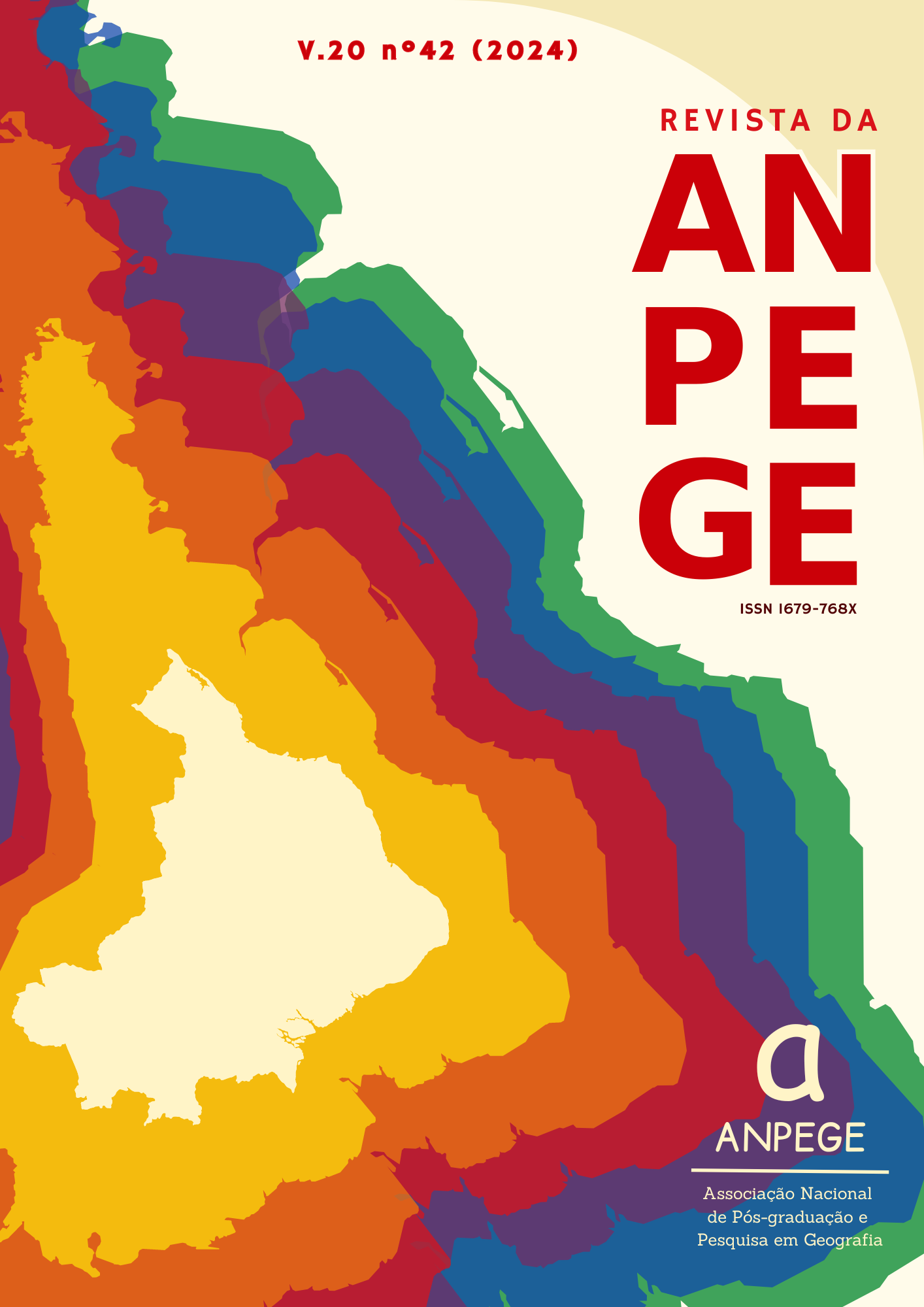El auge de la GEOST: mapeo de la producción de conocimiento científico en la transición hacia la sostenibilidad
DOI:
https://doi.org/10.5418/ra2024.v20i42.18279Palabras clave:
territorio, ciencia y tecnología, progreso técnico, desarrollo sostenible, epistemologiaResumen
Este artículo caracteriza el origen y desarrollo de una nueva línea de investigación, que surge en la intersección entre los estudios del Espacio Geográfico y los movimientos socioeconómicos de Transición Sociotécnica. Esta nueva agenda de investigación se denomina Geografía de las Transiciones hacia la Sostenibilidad (GeoST). Se utilizaron técnicas de bibliometría y la operacionalización del software libre VOSviewer. Este campo de conocimiento está liderado principalmente por no-geógrafos e investigadores del norte global, con poca representatividad de las realidades periféricas, como indican los resultados. Se destaca la relevancia de incorporar GeoST al debate académico y político en la Geografía Brasileña, con potencial para el enriquecimiento mutuo entre comunidades científicas. El estudio indica posibles cruces entre GeoST y la Geografía brasileña. Se enfatiza la relevancia de enfoques interdisciplinarios y la comprensión de las dinámicas espaciales para una sociedad más sostenible.
Descargas
Citas
AVELINO, F. et al. The politics of sustainability transitions. Journal of Environmental Policy and Planning, [s. l.], v. 18, n. 5, p. 557–567, 2016. Available at: https://doi.org/10.1080/1523908X.2016.1216782
BINZ, C. et al. Geographies of transition—From topical concerns to theoretical engagement: A commentary on the transitions research agenda. Environmental Innovation and Societal Transitions, [s. l.], v. 34, n. August 2019, p. 1–3, 2020. Available at: https://doi.org/10.1016/j.eist.2019.11.002
BOHNSACK, R. Local niches and firm responses in sustainability transitions: The case of low-emission vehicles in China. Technovation, [s. l.], v. 70–71, n. February, p. 20–32, 2018. Available at: https://doi.org/10.1016/j.technovation.2018.02.002
BOSCHMA, R. et al. Towards a theory of regional diversification: combining insights from Evolutionary Economic Geography and Transition Studies. Regional Studies, [s. l.], v. 51, n. 1, p. 31–45, 2017. Available at: https://doi.org/10.1080/00343404.2016.1258460
BUSH, J. The role of local government greening policies in the transition towards nature-based cities. Environmental Innovation and Societal Transitions, [s. l.], v. 35, n. January 2019, p. 35–44, 2020. Available at: https://doi.org/10.1016/j.eist.2020.01.015
CANITEZ, F. A socio-technical transition framework for introducing cycling in developing megacities: The case of Istanbul. Cities, [s. l.], v. 94, n. May, p. 172–185, 2019. Available at: https://doi.org/10.1016/j.cities.2019.06.006
CAPCS. CAPCS - Você sabe o que são Operadores Booleanos?. [S. l.], 2018. Available at: http://www.capcs.uerj.br/voce-sabe-o-que-sao-operadores-booleanos/. Acesso em: 11 set. 2022.
COELHO, F. Antropofagia ontem e hoje. Ciência e Cultura, [s. l.], v. 74, n. 2, 2022. Available at: https://doi.org/10.5935/2317-6660.20220020
COENEN, L.; BENNEWORTH, P.; TRUFFER, B. Toward a spatial perspective on sustainability transitions. Research Policy, [s. l.], v. 41, n. 6, p. 968–979, 2012. Available at: https://doi.org/10.1016/j.respol.2012.02.014
CONSONI, F. L. et al. Tendências da mobilidade elétrica na América Latina e ações em curso no Brasil. In: STOPFER, N. et al. (org.). A Mobilidade Elétrica na América Latina:Tendências, oportunidades e desafios. 1. ed. Rio de Janeiro: E-papers Serviços Editoriais, 2021. p. 13–54.
DOREN, D. Van et al. Learning within local government to promote the scaling-up of low-carbon initiatives : A case study in the City of Copenhagen. Energy Policy, [s. l.], v. 136, n. August 2017, p. 111030, 2020. Available at: https://doi.org/10.1016/j.enpol.2019.111030
DOSI, G. Mudança Técnica e Transformação Industrial: a teoria e uma aplicação à industria dos semicondutores. 1. ed. Campinas: Editora da Unicamp, 2006.
DOSI, G. Technological paradigms and technological trajectories. A suggested interpretation of the determinants and directions of technical change. Research Policy, [s. l.], v. 11, n. 3, p. 147–162, 1982. Available at: https://doi.org/10.1016/0048-7333(82)90016-6
EHNERT, F. et al. The acceleration of urban sustainability transitions: A comparison of Brighton, Budapest, Dresden, Genk, and Stockholm. Sustainability (Switzerland), [s. l.], v. 10, n. 3, p. 1–25, 2018. Available at: https://doi.org/10.3390/su10030612
ELSEVIER. Scopus. Disponível em: https://www.elsevier.com/pt-br/products/scopus/content#0-cobertura-do-conte%C3%BAdo. Acesso em: 14 mar. 2024.
EUROPEAN COMMISSION. Just Transition Fund. Regional Policy. Disponível em: https://ec.europa.eu/regional_policy/funding/just-transition-fund_en. Acesso em: 15/04/2024.
FASTENRATH, S.; BRAUN, B. Lost in transition? Directions for an economic geography of urban sustainability transitions. Sustainability (Switzerland), [s. l.], v. 10, n. 7, p. 1–17, 2018. Available at: https://doi.org/10.3390/su10072434
FERNANDES, A. C. Periferia rima com tecnologia? Observações sobre desenvolvimento regional na perspectiva da geografia política da Inovação. Campinas: Instituto de Economia - UNICAMP, 2021.
FONSECA, A.; HEMERLY, G. Qual a parcela de gás carbônico emitida pelos mais ricos. [S. l.], 2023. Available at: https://www.nexojornal.com.br/grafico/2023/12/19/qual-a-parcela-de-gas-carbonico-emitida-pelos-mais-ricos. Acesso em: 12 jan. 2024.
GEELS, F. W. From sectoral systems of innovation to socio-technical systems: Insights about dynamics and change from sociology and institutional theory. Research Policy, [s. l.], v. 33, n. 6–7, p. 897–920, 2004. Available at: https://doi.org/10.1016/j.respol.2004.01.015
GIBBS, D.; O’NEILL, K. The green economy, sustainability transitions and transition regions: A case study of boston. Geografiska Annaler, Series B: Human Geography, [s. l.], v. 96, n. 3, p. 201–216, 2014. Available at: https://doi.org/10.1111/geob.12046
HAESBAERT, R. TERRITÓRIO. GEOgraphia, [s. l.], v. 25, n. 55, p. 1–7, 2023. Available at: https://doi.org/10.22409/GEOgraphia2023.v25i55.a61073
HODSON, M.; MARVIN, S. Can cities shape socio-technical transitions and how would we know if they were? Research Policy, [s. l.], v. 39, n. 4, p. 477–485, 2010. Available at: https://doi.org/10.1016/j.respol.2010.01.020
HODSON, M.; MARVIN, S. Cities mediating technological transitions: Understanding visions, intermediation and consequences. Technology Analysis and Strategic Management, [s. l.], v. 21, n. 4, p. 515–534, 2009. Available at: https://doi.org/10.1080/09537320902819213
INTERNATIONAL ENERGY AGENCY. Monthly Oil Price Statistics. Disponível em: https://www.iea.org/data-and-statistics/data-product/monthly-oil-price-statistics-2. Acesso em: 14 mar. 2024.
KIVIMAA, P.; VIRKAMÄKI, V. Policy mixes, policy interplay and low carbon transitions: The case of passenger transport in Finland. Environmental Policy and Governance, [s. l.], v. 24, n. 1, p. 28–41, 2014. Available at: https://doi.org/10.1002/eet.1629
KÖHLER, J. et al. An agenda for sustainability transitions research: State of the art and future directions. Environmental Innovation and Societal Transitions, [s. l.], v. 31, n. December 2018, p. 1–32, 2019. Available at: https://doi.org/10.1016/j.eist.2019.01.004
KUOKKANEN, A.; YAZAR, M. Cities in sustainability transitions: Comparing Helsinki and Istanbul. Sustainability (Switzerland), [s. l.], v. 10, n. 5, p. 1–18, 2018. Available at: https://doi.org/10.3390/su10051421
LAWHON, M.; MURPHY, J. T. Socio-technical regimes and sustainability transitions: Insights from political ecology. Progress in Human Geography, [s. l.], v. 36, n. 3, p. 354–378, 2012. Available at: https://doi.org/10.1177/0309132511427960
MARKARD, J.; RAVEN, R.; TRUFFER, B. Sustainability transitions: An emerging field of research and its prospects. Research Policy, [s. l.], v. 41, n. 6, p. 955–967, 2012a. Available at: https://doi.org/10.1016/j.respol.2012.02.013
MARKARD, J.; RAVEN, R.; TRUFFER, B. Sustainability transitions: An emerging field of research and its prospects. Research Policy, [s. l.], v. 41, n. 6, p. 955–967, 2012b. Available at: https://doi.org/10.1016/j.respol.2012.02.013
MARQUES, L. Capitalismo e colapso ambiental. 1. ed. Campinas: Editora da Unicamp, 2018. Available at: https://doi.org/https://doi.org/10.7476/9788526815032
MAZZUCATO, M.; SEMIENIUK, G. Financing Renewable Energy: Who Is Financing What and Why it Matters. SSRN Electronic Journal, [s. l.], v. 12, 2016. Available at: https://doi.org/10.2139/ssrn.2796552
MAZZUCATO, M.; SEMIENIUK, G.; WATSON, J. What will it take to get us a Green Revolution? [s. l.], p. 1–16, 2015.
MCGRATH, M. Mudanças climáticas: novo relatório do IPCC adverte sobre impactos “irreversíveis”. [S. l.], 2022. Available at: https://www.bbc.com/portuguese/internacional-60554761. Acesso em: 6 dez. 2023.
MILTON SANTOS. Por uma outra Globalização: do pensamento único à consciência universal. 30oed. Rio de Janeiro: Record, 2020.
MILTON SANTOS. Técnica, Espaço, Tempo: Globalização e Meio Técnico-Científico-Informacional. 5oed. São Paulo: Editora da Universidade de São Paulo, 2013.
MOWERY, D. C.; NELSON, R. R.; MARTIN, B. R. Technology policy and global warming: Why new policy models are needed (or why putting new wine in old bottles won’t work). Research Policy, [s. l.], v. 39, n. 8, p. 1011–1023, 2010. Available at: https://doi.org/10.1016/j.respol.2010.05.008
MUNRO, F. R. The geography of socio-technical transitions: Transition–periphery dynamics. Geographical Journal, [s. l.], v. 185, n. 4, p. 447–458, 2019. Available at: https://doi.org/10.1111/geoj.12306
NELSON, R. R. The Moon and the Ghetto revisited. Science and Public Policy, [s. l.], v. 38, n. 9, p. 666–668, 2011. Available at: https://doi.org/10.3152/030234211X13070021633404
PIKETTY, T. Capital e Ideologia. 1. ed. Rio de Janeiro: Intrínseca, 2020.
PIVETTA, M. As duas Amazônias : Revista Pesquisa Fapesp. REVISTA FAPESP, São Paulo, p. 23–28, 2019.
PIVETTA, M. Julho foi o mês mais quente da história recente e quebrou recordes de temperaturas : Revista Pesquisa Fapesp. [S. l.], 2023. Available at: https://revistapesquisa.fapesp.br/julho-foi-o-mes-mais-quente-da-historia-recente-e-quebrou-recordes-de-temperaturas/?utm_source=instagram&utm_medium=social&utm_campaign=Ed331. Acesso em: 6 dez. 2023.
RAVENA, R.; SCHOTA, J.; BERKHOUTB, F. Space and scale in socio-Technical transitions. Environmental Innovation and Societal Transitions, [s. l.], v. 4, p. 63–78, 2012. Available at: https://doi.org/10.1016/j.eist.2012.08.001
RICHARD NELSON; SIDNEY G. WINTER. Uma Teoria Evolucionária da Mudança Econômica. 1°ed. Campinas: Editora da Unicamp, 2005.
SALLES, J. M. Arrabalde: Em busca da Amazônia. 1. ed. São Paulo: Companhia das Letras, 2022.
SANTOS, M. Metamorfoses do espaço habitado. 6oed. São Paulo: Editora da Universidade de São Paulo, 2014.
SCHUMPETER, J. A. Teoria do desenvolvimento econômico: uma investigação sobre lucros, capital, crédito, juro e o ciclo econômico. São Paulo: Abril Cultural, 1982.
TRUFFER, B.; COENEN, L. Environmental Innovation and Sustainability Transitions in Regional Studies. Regional Studies, [s. l.], v. 46, n. 1, p. 1–21, 2012. Available at: https://doi.org/10.1080/00343404.2012.646164
TUNES, R. Geografia e inovação:questões teórico-metodológicas a partir da Economia Política e da Geografia Econômica. In: GEOGRAFIA DA INOVAÇÃO: TERRITÓRIO, REDES E FINANÇAS. 1. ed. Rio de Janeiro: Consequência Editora, 2020. p. 524.
VESENTINI, J. W. Geografia e Geopolítica, ensaios e resenhas. 1. ed. São Paulo: Universidade de São Paulo, 2020.
VOSVIEWER. Disponível em: https://www.vosviewer.com/. Acesso em: 14 mar. 2024.
Descargas
Publicado
Cómo citar
Número
Sección
Licencia
Autores que publicam nesta revista concordam com os seguintes termos:Autores mantêm os direitos autorais e concedem à revista o direito de primeira publicação, com o trabalho simultaneamente licenciado sob a Creative Commons Atribuição-NãoComercial-CompartilhaIgual 3.0 Brasil que permitindo o compartilhamento do trabalho com reconhecimento da autoria do trabalho e publicação inicial nesta revista.
Autores têm autorização para assumir contratos adicionais separadamente, para distribuição não exclusiva da versão do trabalho publicada nesta revista (ex.: publicar em repositório institucional ou como capítulo de livro), com reconhecimento de autoria e publicação inicial nesta revista.
Autores têm permissão e são estimulados a publicar e distribuir seu trabalho online (ex.: em repositórios institucionais ou na sua página pessoal) a qualquer ponto antes ou durante o processo editorial, já que isso pode gerar alterações produtivas, bem como aumentar o impacto e a citação do trabalho publicado (Veja O Efeito do Acesso Livre em http://opcit.eprints.org/oacitation-biblio.html.)
Authors who publish with this journal agree to the following terms:
Authors retain copyrights and grant the Journal the right of first publication with the work simultaneously licensed under a Creative Commons Atribuição-NãoComercial-CompartilhaIgual 3.0 Brasil that allows others to share the work with an acknowledgement of the work's authorship and initial publication in this Journal.
Authors are permitted to enter into separate, additional contractual arrangements for the non-exclusive distribution of the Journal's published version of the work (e.g., post it to an institutional repository or in a book chapter), with an acknowledgement of authorship and initial publication in this journal.
Authors are permitted and encouraged to publish and share their work online (e.g., in institutional repositories or on their website) prior to and during the submission process, as it can lead to productive exchanges, as well as increase the impact and citation of published work (See The Effect of Open Access - http://opcit.eprints.org/oacitation-biblio.html.)




